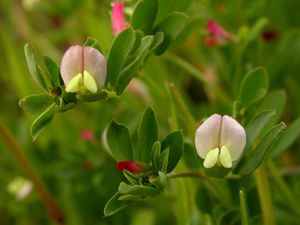Difference between revisions of "Acmispon parviflorus"
From Puget Prairie Plants
(→Taxonomy) |
(→Description) (Tag: VisualEditor) |
||
| (6 intermediate revisions by the same user not shown) | |||
| Line 1: | Line 1: | ||
| − | * | + | * Scientific Name: ''Acmispon'' ''parviflorus'' |
* Family: Fabaceae | * Family: Fabaceae | ||
* Common Names: small-flowered bird's-foot trefoil | * Common Names: small-flowered bird's-foot trefoil | ||
* Synonyms/Misapplications: ''Hosackia'' ''parviflora, Lotus'' ''micranthus'' | * Synonyms/Misapplications: ''Hosackia'' ''parviflora, Lotus'' ''micranthus'' | ||
* Codon: ACMPAR | * Codon: ACMPAR | ||
| − | ==Taxonomy== | + | ---- |
| + | [[File:ACMPAR1.jpg |thumb|Photo by Ben Legler, 2003. Also featured on Main Page]] | ||
| + | |||
| + | ===Taxonomy=== | ||
{{Taxobox | {{Taxobox | ||
| − | | image = | + | | image = |
| image_caption = Photo by Ben Legler, 2003. Also featured on Main Page | | image_caption = Photo by Ben Legler, 2003. Also featured on Main Page | ||
| − | | name = | + | | name = |
| regnum = [[Plant]]ae | | regnum = [[Plant]]ae | ||
| subregnum = Viridiplantae | | subregnum = Viridiplantae | ||
| Line 21: | Line 24: | ||
| subspecies = | | subspecies = | ||
}} | }} | ||
| + | <ref>Integrated Taxonomic Information System. Retrieved from https://www.itis.gov/servlet/SingleRpt/SingleRpt?search_topic=TSN&search_value=820058</ref> | ||
| − | ==Description== | + | ===Description=== |
| − | + | Glabrous, annual herb to 3 dm tall with axillary, cream to yellow papilionaceous flowers.<ref name=":0">Hitchcock, C. L., Cronquist, A., Giblin, D., | |
| − | + | & Legler, B. et al. (2018). ''Flora of the Pacific Northwest: an'' | |
| − | + | illustrated manual''. Seattle: University of Washington Press, p. 128.''</ref> Stems erect to prostate, often branching near base.<ref name=":1">WTU | |
| − | = | + | Herbarium, Burke Museum, & University of Washington. Retrieved from https://biology.burke.washington.edu/herbarium/imagecollection/taxon.php?Taxon=Acmispon%20americanus</ref> Leaves irregularly pinnate to palmate, 3 to 5-foliate, stipules reduced to absent.<ref>Jepson Herbarium Online Flora. Retrieved from https://ucjeps.berkeley.edu/eflora/eflora_display.php?tid=91832</ref> Calyx teeth shorter than or equal to tube; corolla cream to yellowish; stamens 10, diadelphous; ovary simple, superior.<ref name=":0" /> Pods are strongly constricted.<ref name=":0" /> |
| − | + | ||
| − | == | + | |
| − | == | + | ===Bloom Period=== |
| + | April to September<ref name=":1" /> | ||
| − | == | + | ===Distribution=== |
| + | West of the Cascades, British Columbia to California; also the Columbia River Gorge.<ref name=":1" /> | ||
| − | == | + | ===Habitat=== |
| + | Sandy soils, open areas; flat to sloped.<ref name=":0" /> | ||
| − | ==Photo Gallery== | + | ===Photo Gallery=== |
<gallery> | <gallery> | ||
File:ACMPAR2.jpg|Photo: Ben Legler, 2004 | File:ACMPAR2.jpg|Photo: Ben Legler, 2004 | ||
File:ACMPAR3.jpg|Photo: Ben Legler, 2003 | File:ACMPAR3.jpg|Photo: Ben Legler, 2003 | ||
</gallery> | </gallery> | ||
| + | ===References=== | ||
| + | <references /> | ||
Latest revision as of 12:15, 24 June 2021
- Scientific Name: Acmispon parviflorus
- Family: Fabaceae
- Common Names: small-flowered bird's-foot trefoil
- Synonyms/Misapplications: Hosackia parviflora, Lotus micranthus
- Codon: ACMPAR
Contents
Taxonomy
| Scientific classification | |
|---|---|
| Kingdom: | Plantae |
| Subkingdom: | Viridiplantae |
| Phylum: | Tracheophyta |
| Subphylum: | Spermatophytina |
| Class: | Magnoliopsida |
| Subclass: | Rosanae |
| Order: | Fabales |
| Family: | Fabaceae |
| Genus: | Acmispon Raf. |
| Species: | Acmispon parviflorus (Benth.) D.D. Sokoloff |
Description
Glabrous, annual herb to 3 dm tall with axillary, cream to yellow papilionaceous flowers.[2] Stems erect to prostate, often branching near base.[3] Leaves irregularly pinnate to palmate, 3 to 5-foliate, stipules reduced to absent.[4] Calyx teeth shorter than or equal to tube; corolla cream to yellowish; stamens 10, diadelphous; ovary simple, superior.[2] Pods are strongly constricted.[2]
Bloom Period
April to September[3]
Distribution
West of the Cascades, British Columbia to California; also the Columbia River Gorge.[3]
Habitat
Sandy soils, open areas; flat to sloped.[2]
Photo Gallery
References
- ↑ Integrated Taxonomic Information System. Retrieved from https://www.itis.gov/servlet/SingleRpt/SingleRpt?search_topic=TSN&search_value=820058
- ↑ 2.0 2.1 2.2 2.3 Hitchcock, C. L., Cronquist, A., Giblin, D., & Legler, B. et al. (2018). Flora of the Pacific Northwest: an illustrated manual. Seattle: University of Washington Press, p. 128.
- ↑ 3.0 3.1 3.2 WTU Herbarium, Burke Museum, & University of Washington. Retrieved from https://biology.burke.washington.edu/herbarium/imagecollection/taxon.php?Taxon=Acmispon%20americanus
- ↑ Jepson Herbarium Online Flora. Retrieved from https://ucjeps.berkeley.edu/eflora/eflora_display.php?tid=91832



